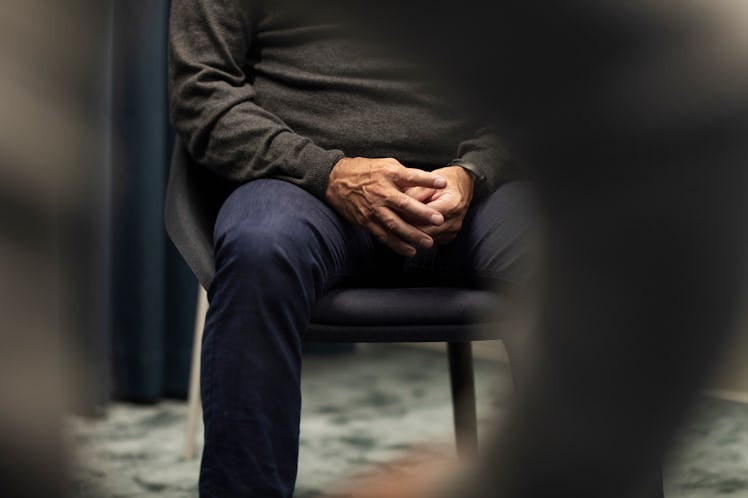Want To Really Kick That Bad Habit? Grieve For It.
One of the more underlooked aspects of changing for the better is mourning what you’re trying to leave behind.

One of the best examples we can set for our kids is to have the willingness to make mistakes and learn from them. That often means letting go of some of our vices, be it gambling, booze, or eating too much cheese. But changing is tough, man. Even when we want to give something up that was causing us negative consequences, losing it can feel like losing a best friend. That’s why we need to mourn. As we implement our New Year's resolutions and strive for better habits, an important step is to allow ourselves to grieve what we are giving up.
“Our brains are wired in such a way that we are called to what's familiar to us, even if it's not healthy,” says Mekel Harris, a psychologist and the author of Relaxing Into The Pain: My Journey Into Grief & Beyond.
It isn’t healthy to remain tethered to a vice. You know this. But it’s hard not to reminisce on the good times, says Natalie Feinblatt, a psychologist and the author of The First 90 Days Of Sobriety: Recovering From Alcoholism: A Guided Journal. “Most people are going to have some sense of sadness and loss, [thinking] I really wish that could have worked out. I really wish things could have stayed good.”
The major difference between, say, mourning a lost loved one versus mourning a bad habit, per Harris, is that death has a finality to it. Even if you deny a person passed, you cannot get them back, yet you can always go back to doing drugs, smoking cigarettes, or crushing salty snacks even if they’re causing you and your loved ones harm. Instead, the acceptance you need to attain is that your old lifestyle is no longer working for you and may never again.
It’s important to validate your feelings and recognize how hard the changes can be. If you don't, Feinblatt warns, they’re going to linger and possibly grow. “Feelings don't go away unless you deal with them,” she says. And you may end up swapping one vice with another to fill the void.
“You don't really get over the death of something,” Harris adds. “It’s sort of embedded in your psyche.” Milestones, locations, and even scents may sweep you back into emotions. “There are many moments where it slaps you upside the head and overwhelms your body, mind, and spirit.”
There are no easy answers. Time doesn’t heal all wounds. “It's what you do in the time that has the possibility to set you up for a different trajectory,” says Feinblatt. Even though your grief may remain, there is work you can do to make it easier. “There are some actionable steps that you can take in the form of self-care, in the form of social support, in the form of seeking therapy or other such support that you may need,” she says. “Taking care of your basic needs. Those are choices and decisions that we make every day to keep living.”
During the process, it might feel unfair that you have to give something up, notes Feinblatt. After all, you didn’t ask to be diabetic or have a genetic predisposition to alcohol. “It's very understandable if you can't get to acceptance right away,” she says. It’s crucial to remember why you’re making the change. So, write down the reasons. Be explicit. Explain to your future self: You should really stick with this. Here's how bad it got. Here's the cost you had to pay for it.
The process of mourning a habit may feel lonely at times. Not everyone will understand why you are grieving. Grief and loss in general are things that we're not taught how to deal with, and if you're trying to address them with other people, other people are either uncomfortable or don't know what to do. “Sometimes,” says Feinblatt “it's best to speak to other people who are going through it because oftentimes they're the only ones who get it.” Connect with those who are in or have been in similar situations. Surround yourself with understanding friends who will remind you to keep going.
You only have to make “a decision [to quit] for right now,” says Feinblatt. It’s cliché but take things one day at a time. Focus on getting through 24 hours without falling into the habit and remember sometimes making mistakes is part of learning to let go. “A slip or a full-on relapse does not mean that you didn't make any progress, and it does not mean that you should just say fuck it,” she says. “You can pick yourself up, dust yourself off, give yourself a little grace, and know that you don't have to do this perfectly.”
There’s also an important incentive to note as you move forward with the process: watching you model problem solving and coping skills is a great gift for children. So is being vulnerable and allowing yourself to cry when necessary. Show them what healthy grieving and quitting looks like.
At the same time, it’s important to remember that it’s not okay to place all of your emotional weight on your child. They aren’t your therapist. Instead, tap into your support system and therapy, and show your kids how to go through what Feinblatt calls the ‘arc of emotion.’ This includes recognizing an emotion, implementing a coping skill, and then showing your child what it looks like to get to the other side.
When you’re grieving a habit, the lessons are strong. “It's okay to acknowledge that you need to change things,” Feinblatt says. “It's okay to try to work on those things. It's okay to struggle with working on those things. You are capable of making changes.” Adult or child, this is something we all need to be reminded of.